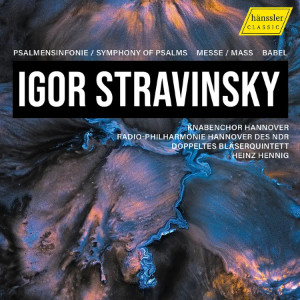
Igor Stravinsky (1882-1971)
Symphony of Psalms (1930)
Mass (1948)
“Babel” from Genesis Suite (narrated in English and German) (1944)
William Reiter (English narrator)
Hannes Schunk (German narrator)
Knabenchor Hannover
Radio-Philharmonie Hannover des NDR/Heinz Hennig
rec. 1991-93, Large Broadcasting Hall of the Hannover Radio House, Hannover, Germany
Hänssler Classic HC24022 [50]
Heinz Hennig – the founder and longtime director of the Knabenchor Hannover, with whom he made recordings for EMI Reflexe, Deutsche Harmonia Mundi, and other labels – conducts these recordings of Stravinsky’s choral music. Originally issued by Calig, they are distinguished by the use of boys for the soprano and alto parts in the Symphony of Psalms and Mass; the composer’s preferred choice, but infrequently heard on records. Transparent, with an even gloss from treble to bass, and remarkable unity of attack, Hennig’s chorus is masterly. Stravinsky, always exceptionally attentive to linear transparency, helps his performers along, but neither can they afford to cruise on auto-pilot. Hennig ensures balance and smooth weaving of the various fugal strands in the “Expectans expectavi Dominum” movement of the Symphony of Psalms—I cannot think of another recording that quite matches the vocal translucence of this one.
Where Hennig stumbles is in conveying the primal energy essential(in both typical senses of that word) of Stravinsky’s music. The great man’s own recordings of his music crackle with the stuff, not least his two earliest of the Symphony of Psalms; made with the Alexei Vlasoff Choir and Walter Straram Orchestra (best heard on Andante RE-A-1100), and the CBS Chorus and Symphony (last reissued on Sony Classical 88875026162) respectively. Despite what he said through his ghostwriter, both recordings seem to compel one to hear music and words as a unified statement on matters outside their immediate reach. Hennig, on the other hand, renders it as an objet d’art of organized abstract sounds.
His talents are better suited to the starker and more dispassionate Mass, yet even here his insistence on holding every note for its full rhythmic value and smoothing out metrical disruptions rob these scores of their characteristically Stravinskian vitality. Daniel Reuss and his RIAS Chamber Choir are similarly earnest on their 2006 recording (Harmonia Mundi HMC 801913), yet the subtle springiness of their rhythmic inflections make all the difference. Robert Craft is even better interpretively (Naxos 8.557504), although his Gregg Smith Singers do not quite equal the finesse of Reuss’ and Hennig’s choruses.
A lovely recording of the slight and campy “Babel” from the multi-composer Genesis Suite ends this disc—but was it really necessary to repeat the same performance with narrations in two different languages?
Stravinsky (in)famously uttered that music was incapable of expressing anything beyond itself, but he never meant to imply that it should be boring as a result. Technically fine though these early 1990s recordings by Germany’s NDR are, they seem to miss this fine point.
Néstor Castiglione
If you purchase this recording using a link below, it generates revenue for MWI and helps us maintain free access to the site



















